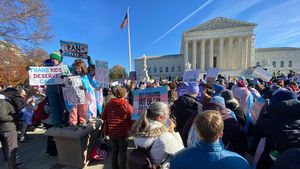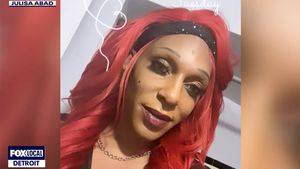Since Trump took office, there’s been a steady assault by this administration on transgender rights. But none were as shocking and potentially wide-reaching as the memo obtained by The New York Times in October 2018. As the paper noted, “The Trump administration is considering narrowly defining gender as a biological, immutable condition determined by genitalia at birth, the most drastic move yet in a government wide effort to roll back recognition and protections of transgender people under federal civil rights law.”
The memo states that “the sex listed on a person’s birth certificate, as originally issued, shall constitute definitive proof of a person’s sex unless rebutted by reliable genetic evidence.” Such wording would narrowly define sex as either male or female and gender would be determined by the attending physician at a child’s birth. The change could have broad ramifications for transgender, gender nonbinary, intersex, and two-spirit people — and would go against expert consensus that gender is not determined by physiology.
According to The Times, “The Department of Health and Human Services has called on the ‘Big Four’ agencies that enforce some part of Title IX — the Departments of Education, Justice, Health and Human Services, and Labor — to adopt its definition in regulations that will establish uniformity in the government and increase the likelihood that courts will accept it.”
The memo clearly sets out to “erase our very existence as transgender people,” noted Transgender Law Center executive director Kris Hayashi in a statement to the press at the time, “We know now that the administration intends to ignore the preponderance of law, science, and evidence on gender identity to empower hate and rollback access to healthcare...”
It’s in the area of healthcare that the ramifications may be particularly dangerous for trans women of color. Transgender women — especially black trans women — have higher rates of HIV than nearly any other demographic. The Centers for Disease Control and Prevention estimates around a quarter (22-28 percent) of trans women are currently HIV-positive, and more than half (56 percent) of black trans women are already living with HIV. Compare that to past predictions that one out of every two gay and bi black men will become HIV-positive in their lifetime if things do not change.
Cecilia Chung, codirector of programs and policy at Transgender Law Center and a trans woman living with HIV, told the San Francisco Bay Area radio station KQED in October that the definition change could impact trans people’s access to health care, including HIV prevention and treatment.
“As a black woman of transgender experience living with HIV, I understand the nuances and hardships of navigating the system,” Octavia Y. Lewis (bottom right) tells Plus. Lewis, who sits on the advisory boards of Positively Trans and the Center of Excellence for Transgender Health at the University of California, San Francisco adds, “This ruling will definitely be a life or death situation as I try to figure out how to continue to get my medication so that HIV will only reside with me and not kill me.”
The Department of Health and Human Services allocates resources for HIV treatment and prevention services based on which groups are most affected by the epidemic. Right now trans women are high on that list. Changing the definition of gender to exclude trans people would make it harder for them to be counted. “It would certainly make us more invisible,” Chung said. “And… you can’t allocate resources to an invisible community.”
At the time of The Times report, amfAR, the Foundation for AIDS Research, released a strongly worded response, arguing, “This is the latest in a string of moves that constitutes a sustained assault on the rights of the estimated 1 to 1.4 million transgender individuals in America. Not only is it a flagrant violation of the human rights of an already marginalized and stigmatized minority, but it would also seriously undermine efforts to combat the nation’s HIV epidemic.”
Kevin Robert Frost, CEO of amfAR, elaborates, telling Plus, “After working with transgender individuals in the U.S. and around the world for many years, it’s clear that a one-size-fits-all approach to HIV prevention just isn’t effective.”
The organization points out that a wide range of intersecting challenges place trans people — particularly those of color — at high risk of HIV, including widespread discrimination by employers and health care providers, social stigma, poverty, and racial discrimination.
“Because HIV is primarily a disease among marginalized populations in the United States, the fight to combat HIV is intrinsically a human rights issue,” Greg Millett, vice president and director of public policy at amfAR said in the earlier statement.
Trans advocates also note that not that long-ago researchers and program administrators still lumped trans women in with gay men, thus burying their unique needs among those of men, and failing to target trans women with prevention and treatment outreach. Returning to those policies would once again render trans women invisible, and undoubtedly increase trans women’s risks of contracting HIV and having poorer health outcomes once HIV-positive.
“Transgender individuals face unique challenges and extremely high levels of stigma and discrimination,” Frost says, adding, outreach to gay men doesn’t help them. “They may not congregate in the same places as gay men and other men who have sex with men, don’t necessarily respond to the same prevention messages, and have different and often complex healthcare needs. So if we want to end HIV [and] AIDS in America, we have to pursue strategies that are tailored specifically to the needs of this often marginalized community that continues to bear the brunt of the HIV epidemic.”
 Achim Howard (top left), founder of Trans Men Rising and an advocate for black trans men living with HIV, fears an even bleaker future in which we “would be reliving a dark, historically horrific time where instead of Jews and blacks being the target, it will be transgender individuals such as myself, living healthy — with HIV — who would be looked at as the outcast or mutants of society, living without a voice [or] equality and only existing to die.”
Achim Howard (top left), founder of Trans Men Rising and an advocate for black trans men living with HIV, fears an even bleaker future in which we “would be reliving a dark, historically horrific time where instead of Jews and blacks being the target, it will be transgender individuals such as myself, living healthy — with HIV — who would be looked at as the outcast or mutants of society, living without a voice [or] equality and only existing to die.”
PrEP navigator Blossom C. Brown, a black trans woman who appeared on I Am Cait and volunteers for the Human Rights Campaign, calls the effort to redefine gender “not only un-American but despicable!” She’s especially concerned about “black trans women not being able to potentially access resources that could be lifesaving, like health care, housing, employment, etcetera.” But she’s not giving up hope. “We are strong,” Brown declares. “We are resilent! And dog gone it, the same way they couldn’t erase our ancestors for their blackness, they will not erase our transness!”
Indeed, there are reasons to hope. Thousands of trans people recently made #WillNotBeErased a trending hashtag. Numerous organizations and activists came out against the memo. And legal experts like Hayashi reassured us, saying, “To be clear: nothing this administration can do will undermine the scores of federal courts that have recognized our humanity and hundreds of state and local legal protections we’ve already won.”
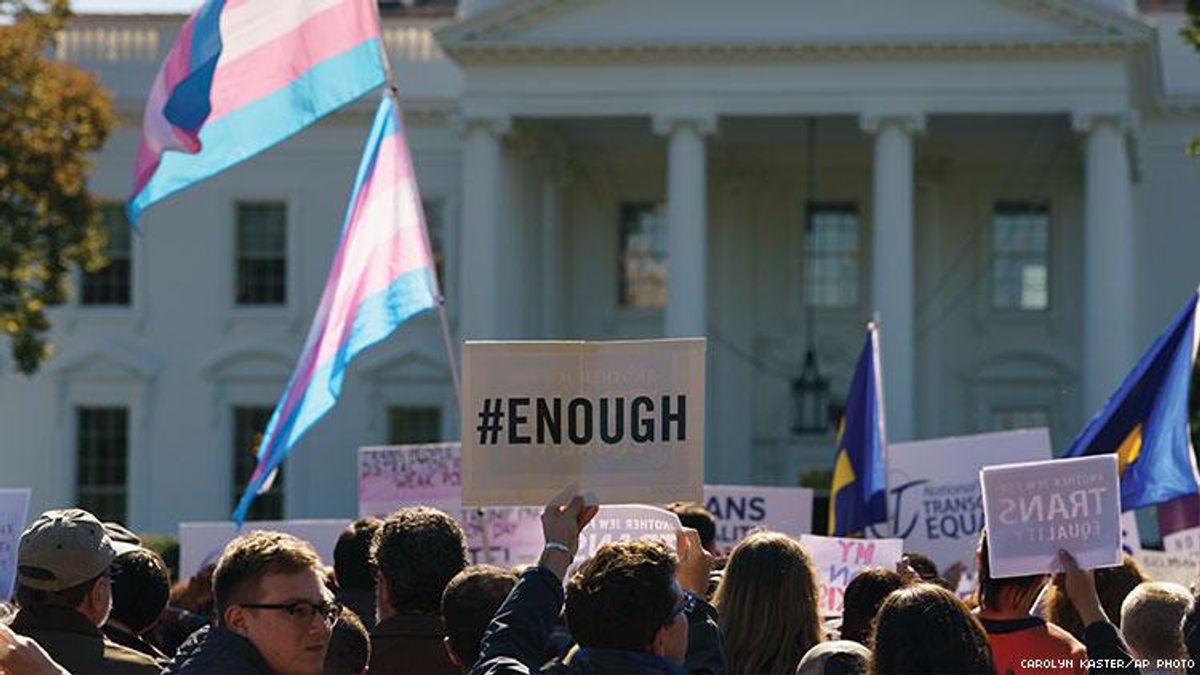






















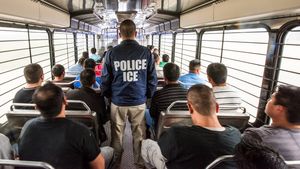
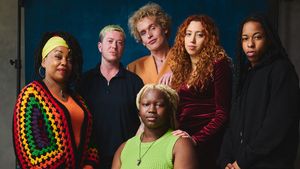





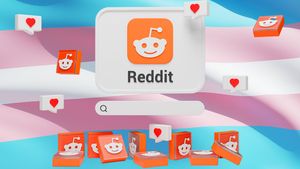
 Achim Howard (top left), founder of Trans Men Rising and an advocate for black trans men living with HIV, fears an even bleaker future in which we “would be reliving a dark, historically horrific time where instead of Jews and blacks being the target, it will be transgender individuals such as myself, living healthy — with HIV — who would be looked at as the outcast or mutants of society, living without a voice [or] equality and only existing to die.”
Achim Howard (top left), founder of Trans Men Rising and an advocate for black trans men living with HIV, fears an even bleaker future in which we “would be reliving a dark, historically horrific time where instead of Jews and blacks being the target, it will be transgender individuals such as myself, living healthy — with HIV — who would be looked at as the outcast or mutants of society, living without a voice [or] equality and only existing to die.”








